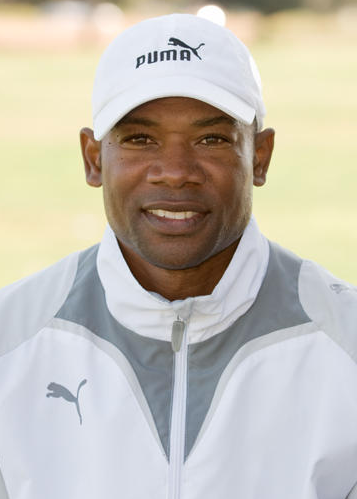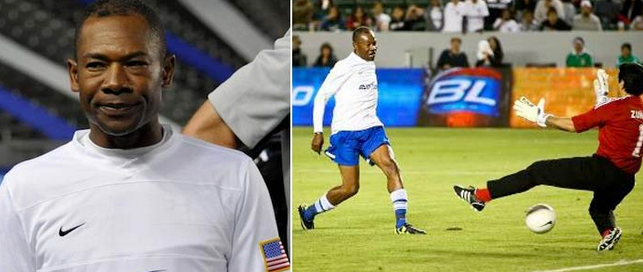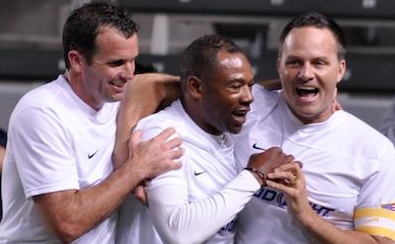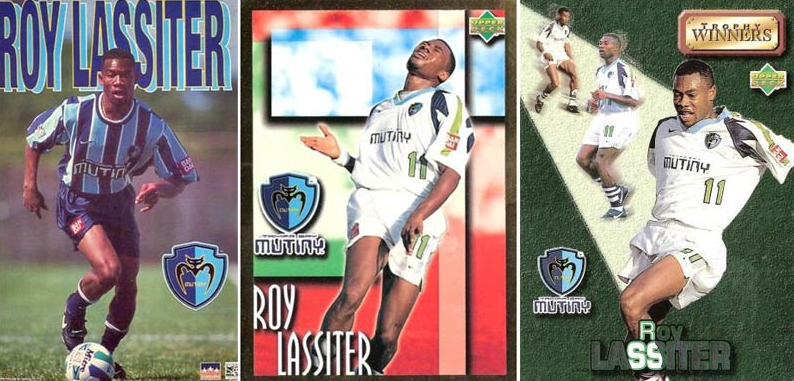MLS’ Top Goal Scorer Roy Lassiter on Developing Youth Soccer Players
San Diego’s Albion Soccer Club. Roy Lassiter Speaks Out on What It Takes To Make It To The Pro Level. “Winning is a byproduct of doing the right thing.”

As a former USA National Team player and MLS Top Goal Scorer, Roy Lassiter brings a wealth of experience and knowledge to his role of Advancement Director at San Diego’s Albion Soccer Club. The former MLS star forward now holds an “A” USSF A NationaLicense and a USSF Y National License and knows from experience what it takes to make it as a professional player. Lassiter shares his advice for youth soccer players, “Players have to work at it every single day. Every time they step on the practice field, it’s a meaningful thing. Youth soccer players always need to have determination and energy.”
Roy Lassiter first gained national attention in 1996 when, as part of the Tampa Bay Mutiny in the inaugural Major League Soccer (MLS) year, he set a record of 27 goals in a single season. Lassiter’s finishing skills and super speed were widely acclaimed.
Roy Lassiter’s record has never been surpassed. Decades passed before Lassiter’s record was even equaled by Chris Wondolowski of the San Jose Earthquakes in the 2012 season.
Born in Washington, D.C., Lassiter grew up in North Carolina and played soccer at the College of Charleston and North Carolina State University. After college, he played with the U.S. Men’s National Team for eight years and three professional clubs in Costa Rica before returning to join the MLS where he played with Miami Fusion, Kansas City Wizards and D.C. United.
While Lassiter may have officially ended his playing career as a goal scoring machine in 2003, he has been found on the field again with a collection of his former U.S. Men’s National Teammates when an all-star team took on Mexico in the Legends Game in 2012. Lassiter scored an important goal in this match, helping his team to earn a 2-0 shutout. The team included Thomas Dooley, Paul Caligiuri, Chris Klein, Clint Mathis, Cobi Jones, Brian McBride, Eric Wynalda, Jovan Kirovski and Cle Kooiman, among others.
Well recognized for this accomplishments on the field of soccer, Lassiter is also a North Carolina and DC United Soccer Hall of Famer
Lassiter became a youth coach after hanging up his pro cleats and was the Director of Coaching at Austin United Capitals in Texas when he met Albion Soccer Club Technical Director Noah Gins in 2008. Gins was interested in Lassiter’s son, Ariel and the two soccer coaches hit it off. The following year Gins invited Lassiter to join the Albion SC and share his insights as a successful professional forward with youth players in San Diego, California.
Gins, Technical Director of Albion Soccer Club says, “Roy brings a great mentality to the club and a level of training and focus that has allowed the club to really progress over the years.”

SoccerNation News Editor-at-Large Stephen Prendergast spoke with Lassiter about his experiences as a player and how he makes a difference for today’s youth players.
Stephen Prendergast: You have had an exceptional career as a player and are known as one of the greatest strikers ever in the MLS. You were a successful forward on the U.S. Men’s National Team and played internationally. Can you tell us a little about that experience?
Roy Lassiter: As a youth I always wanted to challenge myself and played up a year. I remember when I was a U18 and my team came in second in the McGuire Cup. That same year, we played the Nomads. Then I was off to college where I played at the College of Charleston in South Carolina and scored 13 goals as a freshman on the varsity team. Then I switched colleges and I finished up my years at North Carolina State University where I earned ACC awards and First Team All-American.
I was called to the U.S. Men’s National Team in 1992 with Bora Mulitinović, and I earned my first cap that year. Unfortunately, I fractured my ankle and had to leave from the National Team.
After I recovered, I had an offer to play in Costa Rica. I played in Central America for three seasons and then was called back to re-join the National Team in 1995 by coach Steve Sampson. I was fortunate to play with for the USA for several years.
At that time, Major League Soccer was launching. Several MLS coaches had seen me play with the National Team and knew I had also played in Costa Rica. They wanted to bring me into the new league. That’s how my career started in the MLS. In the middle of that I went on loan to Genoa in the Italian League, but I spent the rest of my career with MLS and the National Team.
Stephen Prendergast: You had a standout career is the MLS. What was it like?
Roy Lassiter: I was the single-season goal scoring record holder during my nine years in MLS. My record held was not touched for a long time. There are still players chasing that record. I don’t know where I rank in career goals, but I still hold the single-season record with 27, now paired with Chris Wondolowski.
I also held the all-time scoring record for eight years.
Stephen Prendergast: What do you think of the state of soccer in America today? What kind of changes have you seen since you were a youth player?

Roy Lassiter: It has changed a lot. It’s geared toward the National Team now. There wasn’t the infrastructure or system geared to playing with the National Team – we didn’t have that type of platform.
Professionally, we didn’t have Major League Soccer. The MLS is growing and I would say it is still finding its bearings, but they are doing it intelligently by putting certain teams in certain venues. They have incorporated Canada and they may soon incorporate Mexico. Major League Soccer is certainly growing the business well.
Soccer-wise, I think MLS still needs to get it right when it comes to Reserve Teams.
Also, not many MLS teams have youth academies or soccer clubs under them. I think that is something they should concentrate on right now.
At one time, each MLS team had a Reserve Team, and they had a tournament within that structure. I think we need to bring this back and find a way to make it happen again. It is important to have feeder teams for the MLS.
Overall, I believe the league is growing and improving each year.
I’m very proud to have been able to help lay the foundations for Major League Soccer’s development. While I do not think MLS soccer is as exciting as it could be in every city, I am happy that MLS players now can now make a solid living playing professional soccer. When the MLS was just beginning, it was hard for young players to make it, but now that is changing.
Stephen Prendergast: How important is it for young players to have a league like the MLS to look up to and strive for?
Roy Lassiter: I think it is very important. Our youth soccer players need to have a professional league in the USA that they can look up to and hope to one day play in.
Stephen Prendergast: How can youth coaches best help young players to become successful?
Roy Lassiter: All youth soccer players are trying their hardest, but there is a lot of failure that goes on within any sport.
The biggest thing as youth players get older is for them to have the mental strength to withstand adverse situations. I think youth coaches have to be more inspirational for these young players and help them succeed on this level.
The kids generally know how to play the game of soccer. I believe if a coach stepped out of the way when elite players are on the field and just rolled the ball out, you would see some players can do amazing things. It’s when our youth start thinking about where they are in the game and what they can and can’t do, that is when the game begins to be overwhelming.
I think when that happens, it’s extremely hard for them to be successful. Not all players reach this point, but I think we as coaches need to be role models for when it happens. We need to be teachers, we need to be educators, and we need to be friends at times as well. We need to be someone they can trust and be able to approach and talk with to work things out. It’s important that coaches can be looked up to.
Stephen Prendergast: What is your philosophy of coaching? As a former pro soccer player with a stellar record, you know what it takes to succeed.
Roy Lassiter: My philosophy of youth soccer coaching is to focus on the development of the player and bringing out the best in the player so they have the tools to use to go on to the highest level they can possibly reach.
I think once you’ve given youth soccer players these tools, they will have the capability and the confidence to be successful down the road.
Stephen Prendergast: You mentioned player development. Is there one “Holy Grail” of player development or are there a variety of approaches that work?
Roy Lassiter: I think you said it best; there are a variety of approaches because not all players develop in the same way.
Players have different needs at different times, and it is important that a club can try a variety of developmental programs to help players at each stage.

I think a lot of clubs get so focused on wins and losses and the prestige of the club that they forget about the different programs that will help their players along the way, especially in the more meaningful stages such as high school and college.
I don’t think there is just one system that is going to fit for every single club. There are some clubs that have more talented players than others, and they continue to focus in on those top performers. There are some clubs that want to work on players at every level and move them to the next level according to their talent. That’s when a club is doing their homework, when they can find a way to move each and every player in every team to the next level.
Stephen Prendergast: What does Albion SC do best in helping players develop and move to that next level?
Roy Lassiter: At Albion SC, the next level after club is college soccer and we are dedicated to helping our players play soccer at great colleges and gain scholarships.
I think we create programming to really develop our players. We want to compete and win, and we want to develop all of our players at the same time.
Each player has different needs, and I think we concentrate on that fact. We try to look at every single player and find out what their needs are and how they are going to continue to grow and get to where they want to be in their later stages of youth soccer. I think that is what has made us successful. We’ve really tuned in all the details of our program in order to cater to the needs of every player that comes to our club.
Stephen Prendergast: How did you first become involved with Albion SC?
Roy Lassiter: I was Director of Coaching with Austin United Capitals and I got a call from Noah Gins, who was interested in my son, Arial. He had seen my son play soccer and we started talking. We found that our philosophies meshed quite a bit and he let me know he was looking for another director within the club. He brought me out to San Diego a couple times to see the facilities and the club as a whole. I was intrigued with what Noah was accomplishing, his ideas and where he wanted to take the club in the future. I saw that it matched with what I wanted to do, which wasn’t happening in Texas, and it all came together in January of 2009.
Stephen Prendergast: What is your current role at Albion SC?
Roy Lassiter: I am currently the Advancement Director for the club. I oversee the U11 through U14 teams. We have close to 20 teams and 11 coaches at that level.
Stephen Prendergast: Albion has a program that gives players the opportunity to travel and play in other countries. Why do you feel this is important?
Roy Lassiter: International travel gives players another added layer of experience. They get to see different clubs and learn other systems. They can begin to understand different cultures and learn different languages when they travel abroad. Also important, players learn there are different ways of doing things in soccer. I think this is very important for their experience in the game.
When I was younger I traveled to Germany and saw how the Germans trained, played and prepared. I was a great experience for me.
Stephen Prendergast: What would your advice be to any young player who is thinking of possibly going professional one day?
Roy Lassiter: The greatest advice I would give to players who wants to play professional soccer is that they have to work at it every single day.
Every time they step on the practice field, it’s a meaningful thing. They need to be going all-out every time. They can’t “half” it, they can’t “wing” it, they can’t go hard one day and not the next.
If you want to be a high-level professional athlete, you’re going to have to come up with it every single session. I believe when you do that in a practice session, then you’re most likely going to do that in a game.
I also think players need to watch soccer; players need to watch soccer on TV, and I don’t think they do that enough. It’s important for them to know coaches, know players, know teams and know the things that are happening in the soccer world. If you know all that, then you have a little bit more knowledge and a better understanding of the game. You must be watching soccer as well as playing soccer all the time.

Stephen Prendergast: What advice would you have for any player who to take their game to the next level?
Roy Lassiter: I think there are two things that players really need in order to improve: Players need to have determination and energy.
Players who want to improve need to bring a sense of energy and a sense of intensity to the game. This will force their technical skills to come out on the field. Players then need determination – the determination to win a 50-50 ball, the determination to go up for a header, the determination to slide in and put a ball in the net or slide in and take a ball from an attacking player. That is determination.
The game is basically simple. When players can focus in on those two things, they will come to find their technical ability will emerge.
Stephen Prendergast: What has been your greatest thrill as a coach?
Roy Lassiter: My greatest thrill as a coach has been to see players improve.
For example, there is a player who was on the U12 second team at a club I coached at and now is part of the National Team. I worked with that player and saw that player’s talent level grow. I think that is probably the most gratifying thing for most coaches – to see a player make that kind of growth. When you see that you know you’re doing your job and doing the right thing.
It is the utmost gratification when I see players develop from where they were a few years ago to where they are today.
As a coach, I also like seeing my teams perform well on the field. I am coaching three teams this year at Albion SC and they all have a great record of wins. Winning is a by product of doing the right thing and I am very proud of my players.






